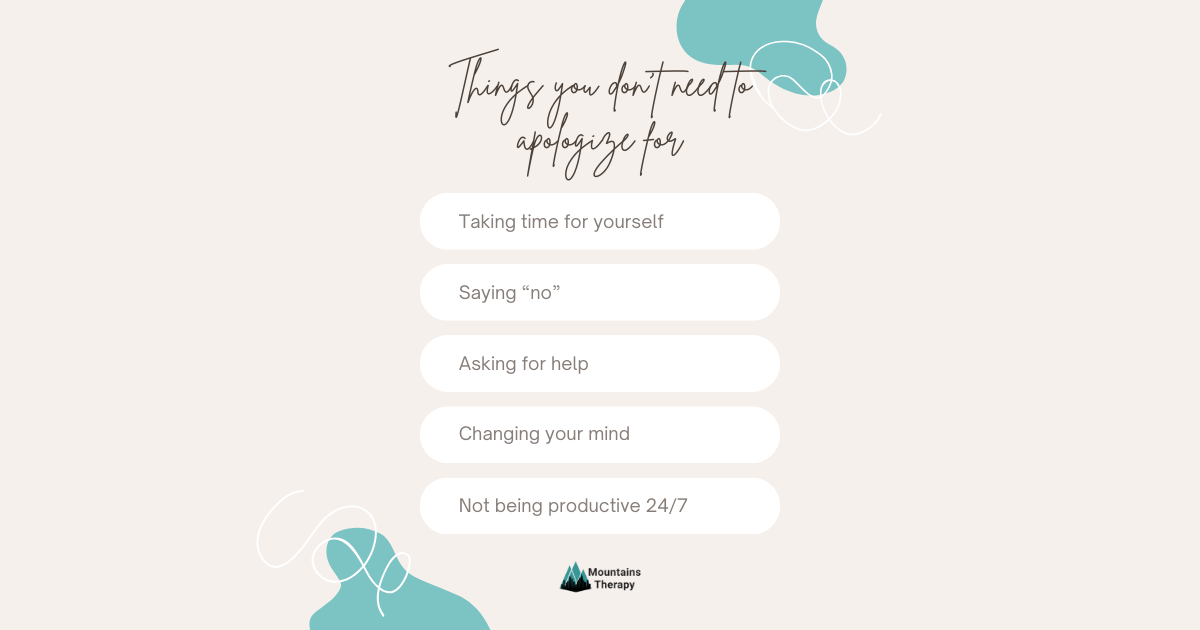Things You Don’t Have to Apologize For

Embracing Self-Compassion and Self-Care
At Mountains Therapy, we’re passionate about helping people lead fulfilling lives that honor their mental, emotional, and physical well-being. Yet, in a world that often expects endless productivity and selflessness, practicing self-compassion and self-care can feel like radical acts. However, they are essential to a healthy, balanced life. Here, we’ll discuss a few things you should never feel the need to apologize for and explore how self-compassion and self-care play a role in each of these areas.
1. Not Being Productive 24/7
It’s easy to feel guilty for taking a break, especially when productivity is often viewed as a measure of success. But constantly pushing yourself can lead to burnout and stress. Self-compassion is about recognizing when you need rest and honoring that need without guilt. Rest isn’t the opposite of productivity; it’s what fuels it. By allowing yourself downtime, you’re investing in your well-being and ultimately enhancing your ability to function at your best. So, take that break, knowing that it’s part of a sustainable self-care routine.
2. Saying “No”
Saying "no" is a powerful act of self-care and boundary-setting. When we say "yes" to everything, we often neglect our own needs and end up feeling drained. Self-compassion teaches us to prioritize our energy and protect it by being selective about our commitments. Saying "no" doesn’t make you less caring or committed—it allows you to show up fully for the things you choose to say "yes" to. By embracing the strength to say "no," you’re actively practicing self-care and honoring what’s best for your well-being.
3. Asking for Help
Self-compassion also involves recognizing that you don’t have to do everything on your own. Asking for help is not a sign of weakness; it’s a sign of resilience and wisdom. Whether you’re reaching out to friends, family, or mental health professionals, seeking support is a profound act of self-care. It takes courage to be vulnerable, and in doing so, you’re building a foundation of trust and connection with those around you. Remember, seeking help is a way to show kindness to yourself—it’s an essential step in nurturing your growth and well-being.
4. Changing Your Mind
Life is full of shifts and changes, and evolving perspectives are a natural part of growth. Self-compassion means allowing yourself to change your mind without self-criticism or shame. Maybe you’ve changed your career path, re-evaluated your goals, or shifted priorities. That’s okay! Change is a sign of adaptability and resilience. When we approach our decisions with self-compassion, we accept that it’s okay to move in a new direction. Being flexible and kind with ourselves as we navigate change is a vital part of self-care and personal growth.
5. Taking Time for Yourself
Self-care isn’t selfish—it’s foundational to a balanced, fulfilling life. Taking time for yourself is one of the most profound acts of self-compassion. When you prioritize your well-being, you’re recharging your energy, allowing yourself to heal, and creating space to process your emotions. Whether it’s through meditation, exercise, hobbies, or simply enjoying a quiet moment alone, taking time for yourself is not something to apologize for. By nurturing yourself, you’re building a stronger, healthier foundation that benefits not only you but also those around you.
Self-compassion and self-care go hand in hand.
Practicing self-compassion allows you to be gentle with yourself and recognize that you deserve care and kindness just as much as anyone else. At Mountains Therapy, we encourage everyone to embrace their humanity, let go of unnecessary guilt, and honor their well-being without apology. Self-care and self-compassion aren’t luxuries—they’re essentials for a life that celebrates balance, growth, and resilience.










